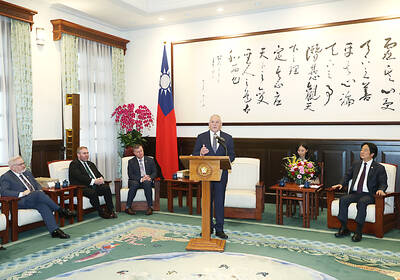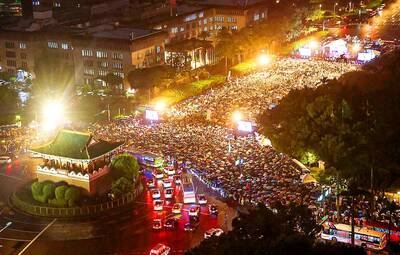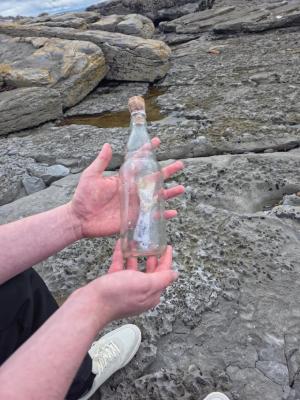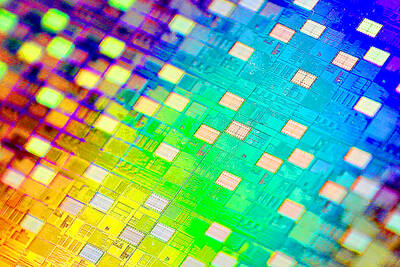A series of exchanges between President Chen Shui-bian (
Some observers and politicians, however, believe visible friction between Hsieh and Chen is part of the DPP campaign strategy to team up contrasting strengths.
A high-ranking government official and former DPP strategy adviser said Chen and Hsieh's "disagreements" indicate "close cooperation, with an appropriate division of labor."
"It is like what Hsieh said: It would be pointless to elect a president that is not much different from the previous one," said the official, who spoke on condition of anonymity.
The official said that national identity and sovereignty were decisive issues in the election and key to the DPP's campaign strategy because they have long been the party's core platform.
A candidate's capacity to improve the economy, on the other hand, only becomes clear with performance, he said.
Hsieh's position on identity issues is clear to the public, he said, which is why the DPP hopeful is focusing his platform on the economy at this stage.
Chen, by comparison, sees elections from a different perspective and believes the sovereignty issue is not only key in elections, but also a matter of life and death for Taiwan, the official said.
"If Hsieh is practicing political Tai Chi -- emphasizing love, trust, reconciliation and coexistence -- Chen is a warrior fighting bloody battles on the frontline," he said. "It does not necessarily mean there is a divergence of values or the direction the party will take. They just have different styles."
While Chen and former DPP chairman Yu Shyi-kun work on consolidating the pan-green camp's support base, Hsieh believes he should first woo "centrist" voters by addressing economic issues, the official said, adding that "deep green" voters could be counted on.
The official dismissed criticism that Chen's vocal campaign against the Chinese Nationalist Party (KMT) and its presidential candidate, Ma Ying-jeou (馬英九), is overshadowing Hsieh and forcing him to play second fiddle at a time when he should be showing off leadership skills.
That is not a concern, the official said, because Hsieh has taken charge of his campaign and feels comfortable taking the lead.
"It is true that the roles of leading and supporting actors must be clearly separated, but sometimes the supporting actor plays an important part," the official said. "I think Hsieh most likely thought things through in advance and realized he needed to share the work load with Chen."
Jerome Keating, a political analyst based in Taipei, said he believes the increasingly apparent contrast between Chen and Hsieh is not so much a campaign strategy as the result of two different campaign styles.
"I do think they need to talk to each other," Keating said.
Chen and Hsieh "possibly could work out a strategy, but I don't see the strategy yet," he said, adding that Chen and Hsieh could use a "good cop, bad cop" arrangement to make tough comments without hurting Hsieh at the polls.
Keating said he hoped Hsieh realized the identity issue was not the only key issue in this election, adding that neglecting to address other concerns could backfire.
"Identity is a tricky thing because in one sense, it can be misplayed as an ethnic division" between ethnic Taiwanese and Mainlanders, he said.
Keating said that candidates shouldn't stress identity without making it clear that it is not an issue of ethnicity, but rather an issue of putting Taiwan first and defending the nation's democracy.
In addition, Hsieh's platform shouldn't focus on economic prosperity without making good use of the fact that the nation's economy is solid and better than other countries in the world, he said.
The pan-blue camp and Ma realize that they need to divert attention from the identity issue and their stolen assets, he said, so their only platform option is to try and make something out of voters frustrated with the economy, Keating said.
Hsieh should be highlighting Ma's promises, Keating said, adding that the former KMT chairman and Taipei mayor was good at making promises but bad at delivering.
"Ma promises a chicken in every pot and pie in the sky," he said.
Keating said many voters are wooed by these promises, but Ma's political history has shown reason for skepticism.
Wu Chung-li (
"Ethnic issues, national identity and the KMT's stolen assets will dominate the elections because they are simple and easily stir up passions," Wu said. "Hsieh isn't putting much emphasis on these issues now because he is still testing the water and it's not time yet."
Wu said Hsieh was focusing on the economy to court swing voters.
Wu said that Hsieh and Chen did not like each other, but Hsieh would not distance himself from Chen, nor would their differences cause a split in the DPP.
Wu said the DPP had a special party culture of tolerating passionate internal debate, but uniting when election time rolls around.

‘NON-RED’: Taiwan and Ireland should work together to foster a values-driven, democratic economic system, leveraging their complementary industries, Lai said President William Lai (賴清德) yesterday expressed hopes for closer ties between Taiwan and Ireland, and that both countries could collaborate to create a values-driven, democracy-centered economic system. He made the remarks while meeting with an Irish cross-party parliamentary delegation visiting Taiwan. The delegation, led by John McGuinness, deputy speaker of the Irish house of representatives, known as the Dail, includes Irish lawmakers Malcolm Byrne, Barry Ward, Ken O’Flynn and Teresa Costello. McGuinness, who chairs the Ireland-Taiwan Parliamentary Friendship Association, is a friend of Taiwan, and under his leadership, the association’s influence has grown over the past few years, Lai said. Ireland is

FINAL COUNTDOWN: About 50,000 attended a pro-recall rally yesterday, while the KMT and the TPP plan to rally against the recall votes today Democracy activists, together with arts and education representatives, yesterday organized a motorcade, while thousands gathered on Ketagalan Boulevard in Taipei in the evening in support of tomorrow’s recall votes. Recall votes for 24 Chinese Nationalist Party (KMT) lawmakers and suspended Hsinchu City mayor Ann Kao (高虹安) are to be held tomorrow, while recall votes for seven other KMT lawmakers are scheduled for Aug. 23. The afternoon motorcade was led by the Spring Breeze Culture and Arts Foundation, the Tyzen Hsiao Foundation and the Friends of Lee Teng-hui Association, and was joined by delegates from the Taiwan Statebuilding Party and the Taiwan Solidarity

An SOS message in a bottle has been found in Ireland that is believed to have come from the Taiwanese captain of fishing vessel Yong Yu Sing No. 18 (永裕興18號), who has been missing without a trace for over four years, along with nine Indonesian crew members. The vessel, registered to Suao (蘇澳), went missing near Hawaii on Dec. 30, 2020. The ship has since been recovered, but the 10 crew members have never been found. The captain, surnamed Lee (李), is believed to have signed the note with his name. A post appeared on Reddit on Tuesday after a man

Instead of threatening tariffs on Taiwan-made chips, the US should try to reinforce cooperation with Taiwan on semiconductor development to take on challenges from the People’s Republic of China (PRC), a Taiwanese think tank said. The administration of US President Donald Trump has threatened to impose across-the-board import duties of 32 percent on Taiwan-made goods and levy a separate tariff on semiconductors, which Taiwan is hoping to avoid. The Research Institute for Democracy, Society, and Emerging Technology (DSET), a National Science and Technology Council think tank, said that US efforts should focus on containing China’s semiconductor rise rather than impairing Taiwan. “Without